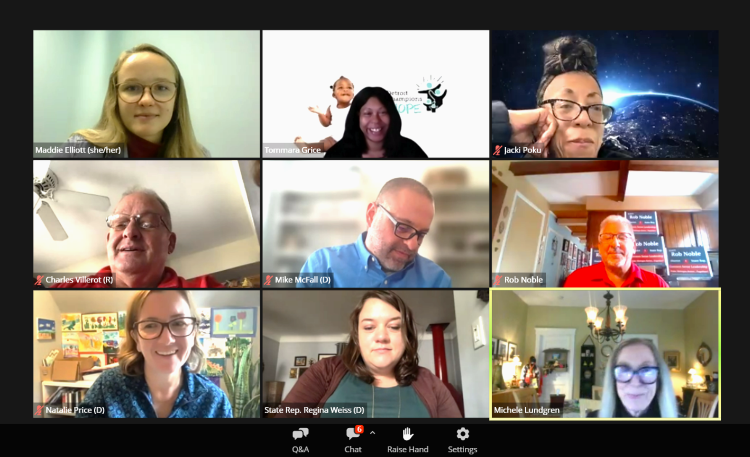Could a living wage for child care workers solve shortages? Michigan candidates weigh in
The national average wage for a child care worker is now $13.22 per hour, and nearly 90,000 people have left the industry in the last two years. In Michigan, the shortage has left thousands of parents waiting for open spots in struggling facilities. Parents and childcare advocates showed up at a virtual forum recently to ask local candidates running for Michigan’s State House this November about solutions.

In Michigan, and across the country, parents are struggling to find affordable, quality child care. Many early education centers that have been able to weather the pandemic are still not functioning at capacity due, mainly, to a crisis in staff shortages. Nearly 90,000 fewer people are working in the child care industry today compared to early 2020, with workers leaving the industry for higher wages and benefits offered by food service chains and retail stores. It’s one of the main reasons that parents of 54,000 children in Michigan, and 22,00 children in Detroit, are waiting for an open spot.
The national average wage for a child care worker is $13.22 per hour, up from $11.65 prior to COVID-19. Employees at companies like Amazon, Target, and Aldi start out making higher wages. Coupled with rising costs of food, gas, and housing, child care advocates say talent is also shifting from early education to K-12, where the job may be similar, but the pay is significantly higher. Currently, the average teacher kindergarten salary in Michigan is $59,335.
Concerned parents gathered recently at a virtual forum to ask Michigan’s House candidates how they plan to support a living wage for child care workers, as well as their stance on public school funding, affordable childcare and universal pre-K, equitable access to mental health support for young children, child tax credits and abortion rights.
Candidates in attendance at the Detroit Champions for Hope event represented eight different House districts, all touching at least a portion of Detroit. Some are seeking re-election, while others are running for the first time. We’ve listed them here according to the district they hope to represent in Michigan’s newly drawn map released earlier this year by the Michigan Independent Citizens Redistricting Commission (MICRC).
Though not all candidates stayed for the entire forum, in attendance was Rep. Tyrone Carter D- (District 1), Rep. Regina Weiss, D- (District 6), Charles Villerot, R- (District 6), Mike McFall, D- (District 8), Rob Noble, R- (District 8), Natalie Price D- (District 5), Rep. Abraham Aiyash D- (District 9), and Michele Lundgren R- (District 9). Here’s what they had to say.
Question: What will you do to prioritize a living wage for our childcare and early education staff and teachers?
Charles Villerot said, “To tell you the truth, I have no idea how you’re going to raise wages for them outside of a need. If there’s a need there for it, then people have to pay more for those services. If you’re looking for a government response, for just padding it back up and artificially raising it, I will not raise it. I do not believe that’s going to work.”
Mike McFall, said, “I do support it. We could be helping these businesses pay them more. It’s amazing to me that you can go and work for Amazon and make more than someone who drives an ambulance that holds our lives in their hands. If we want people to be in the industry, then we have to make sure that people are getting paid, that’s what draws people to it, and there is a need for it. I am all in favor of whatever we can do to increase that and make it happen.”
Councilwoman Price said she supports a livable minimum wage for all workers. She pointed to her work on Berkley’s City Council, where she advocated and helped pass a budget this summer that ensures all city employees are paid $15 an hour or $40,000 a year. Getting people above the poverty level is very important, she said.
“In terms of teachers and childcare providers, when we’re looking at things the state funds, and negotiating with the teachers union, we need to recognize that many teachers’ salaries and benefits packages have not kept up with the rate of inflation,” she said. “We need to take that into consideration, and help compensate accordingly, to help keep good educators in the field. I also think there’s the possibility of a student-loan forgiveness program, for people who train in early childhood, or as teachers, to have their loans forgiven when they go into public service.”
Rob Noble said, “As far as childcare providers, if they’re an independent company, there’s not a lot we can actually do about that, except they can raise their rates. That’s it.”
“But, on the other side, as someone who’s been married to a school teacher who’s been teaching for over 30 years, I can tell you without a doubt, our teachers need to be paid equivalently to corporate America with the same timeline of job and the same educational levels. My wife has a master’s degree and if she was in corporate America, she’d be making double the amount. So that’s something we need to look at seriously. because they take care of our kids… We need our teachers to be taken care of first and foremost. Give them the pay they need and they will stay in the profession.”
Michele Lundgren said she’s in favor of a high school co-op program to help bolster the sector, where students interested in early education can pursue academics half the day, and work at a child care facility for school credit and minimal pay during the second half.
“You pay them a minimal amount but they’re going to get credit, and experience, and maybe a reduction in their student loans or the amount they’re paying for class,” she said. “Bring this opportunity out in the public. Take these young adults who are learning a craft in childcare, child mental health, etc., and bring it out to the streets. Let them go out to various facilities or houses. Everything you see that people are charging lots and lots of money for, I think you can do it with someone on the way to that profession, and they’ll learn on the job.”
Regina Weiss said she’s very supportive of making sure the state is doing everything possible to pay child care and early educators, as well as all educators, well. Last year, the state budget closed the pay gap across the board for K-12 schools for the first time, she said, and brought pre-K funding to the same level as K-12, which continued this year as well. The previous inequality of that funding had been a barrier to early childhood education, she said.
“So that’s equal, but we know in terms of equitable funding, it costs more money to educate at a pre-K level than it does at K-12 level, and so I’m supportive of increasing even beyond how we’re funding K-12 in our pre-K system,” she said, “to support not only those teachers, but all of those needs across the board for students. I think we also need to look doing everything we can at the state to ensure that districts are paying teachers well for the work they’re doing, so we can address the teacher shortage, both at the pre-K level and across the board.”
Make sure to check out the rest of this series to hear how these candidates responded to more questions from parents around early child care and education. This community conversation has been edited for clarity and brevity.
This entry is part of our Early Education Matters series, exploring the state of early education and childhood care in our region. Through the generous support of the Southeast Michigan Early Childhood Funders Collaborative (SEMI ECFC), we’ll be reporting on what parents and providers are experiencing right now, what’s working and what’s not, and who is uncovering solutions.




